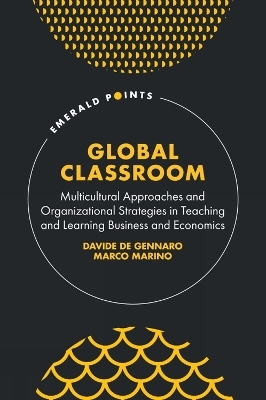
Global Classroom
Emerald Publishing Limited (Verlag)
978-1-83549-285-7 (ISBN)
Acknowledging the need for more discussion in the literature as business becomes more global, and as students are not just learning to operate within their home countries; they are learning to engage with different cultures and economic systems, the chapters confront methodologies that are still grounded in Western-centric ideologies and raises awareness of the complexities involved in teaching a culturally diverse student body. Seeking to arm educators with specific strategies to tackle challenges, such as language barriers, ethnocentric curricula, and varying degrees of familiarity with technology in a constantly more globalized and multicultural environment, the chapters act as a catalyst for instigating institutional change by providing administrators and policymakers with insights into the need for more inclusive pedagogical training and resources.
Weaving in real-world case studies and expert interviews and placing special emphasis on the case study of Sant’Anna Institute in Sorrento, Italy, this book combines theory with practical advice and serves as a timely and essential tool for educators, administrators, and policymakers engaged in business and economics education in a culturally diverse setting.
Davide de Gennaro is Senior Assistant Professor of Organization studies at University of Naples Parthenope, Italy, and Head of Department of Management and Marketing at Sant’Anna Institute in Sorrento, Italy. Marco Marino is the Vice President of Academic Affairs at Sant’Anna Institute in Sorrento, Italy.
Introduction: The landscape of modern higher education in business and economics; Matthew C. Rousu
Section I. Understanding the global business classroom
Chapter 1. Becoming culture, transmitting culture; Aneta Chybicka and Andrzej Piotrowski
Chapter 2. Culture and its impact on learning; Shima Mirzaei
Chapter 3. Varied educational backgrounds: Learner aspirations, active instruction and classroom expectations; Joanna Simos
Chapter 4. The landscape of global business higher education; Jan Klakurka and Candice Chow
Section II. Challenges and strategies for success
Chapter 5. Between multiculturalism and multilingualism: Educational challenges in contemporary societies; Vincenzo Basile and Clelia Cascella
Chapter 6. Ethnocentric curricula and western-centric methodologies; Iñaki Pérez-Ibáñez
Chapter 7. Effective communication techniques for a diverse student body; Carol Del Vitto
Chapter 8. Strategies for engaging a multicultural classroom; Ingrid S. Greene
Section III. So in the classroom, so in the workplace: managerial perspective and the role of HRM
Chapter 9. Diversity and inclusion: From classroom discussion to corporate policies; Floriana Pollio and Filomena Riemma
Chapter 10. Managing workforce diversity with AI-based HRM; Viviana Colombi Evangelista and Ludovica Del Barone
Chapter 11. How HR interacts with and influences Diversity, Equity and Inclusion; Charles J. Priolo
Section IV. Technology bringing distant worlds closer
Chapter 12. Leveraging technologies for inclusion: Insights on higher education organizations; Eleonora Veglianti and Luisa Varriale
Chapter 13. The virtual global classroom; Paola Cascinelli
Chapter 14. The evolving landscape of AI in higher education; Lynne Bowker
Chapter 15. Unlocking the wealth of cultures with technology; John D. Branch and Amy Gillett
Section V. Real-world applications
Chapter 16. Training and skills development in business: The case of the Sant’Anna Institute; Marco Marino and Davide de Gennaro
Chapter 17. The role of avatars in enhancing cultural diversity and classroom dynamics in education; Bice Della Piana, Sara Carbone, Francesco Di Vincenzo, and Chiara Signore
Chapter 18. Enriching student learning experiences and global awareness through inclusive intensive abroad course: A case study (abridged) of Strategy in the European Context; Jan Klakurka and Candice Chow
Chapter 19. Promoting equality through ethical AI and DEI principles: A case study of the LSST; Emilia D’Avino, Davide de Gennaro, Laura Inno, and Giulia Vicentini
Chapter 20. Language barriers and communication hurdles at the University of Rhode Island; Sigrid Berka and Donna Gamashe-Griffiths
Section VI. Conclusions and recommendations toward a more inclusive future
Chapter 21. Policy recommendations and institutional changes; Harika Rao
| Erscheinungsdatum | 01.10.2024 |
|---|---|
| Reihe/Serie | Emerald Points |
| Verlagsort | Bingley |
| Sprache | englisch |
| Maße | 152 x 229 mm |
| Gewicht | 382 g |
| Themenwelt | Sozialwissenschaften ► Pädagogik ► Didaktik |
| Sozialwissenschaften ► Pädagogik ► Erwachsenenbildung | |
| Sozialwissenschaften ► Pädagogik ► Sonder-, Heil- und Förderpädagogik | |
| ISBN-10 | 1-83549-285-1 / 1835492851 |
| ISBN-13 | 978-1-83549-285-7 / 9781835492857 |
| Zustand | Neuware |
| Haben Sie eine Frage zum Produkt? |
aus dem Bereich


